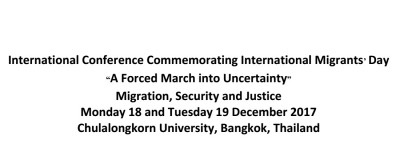


ศูนย์วิจัยการย้ายถิ่นแห่งเอเชีย จะจัดงานประชุมวิชาการนานาชาติ เรื่อง
International Conference Commemorating International Migrants’ Day
“A Forced March into Uncertainty” Migration, Security and Justice
ระหว่างวันที่ 18-19 ธ.ค. 2560
ลงทะเบียน
http://gg.gg/Migrants-Day-2017
International Conference Commemorating International Migrants’ Day
“A Forced March into Uncertainty”
Migration, Security and Justice
Monday 18 and Tuesday 19 December 2017
Chulalongkorn University, Bangkok, Thailand
The reasons migrants make the calculated and very difficult decision to migrate within the ASEAN region are consistent in there being no work at home and a desperate need to earn money for their families, who either remain at home, or travel with them. Regionally, it is the push – pull factor, where migrants in countries of origin (CoO) migrate to countries of destination (CoD) due to better economic opportunities. The vast majority of migrant workers are unskilled and more often than not, undocumented. Individually these factors have their own inherent risks and consequences, including harm to their personal safety, exploitation, discrimination, arrest and deportation; and when combined, it can often be a horrendous experience and sometimes fatal.
There are numerous international and regional frameworks relating to migration including ICESCR, ICCPR, ILO Conventions; ASEAN AEC Blueprint 2015, AICHR, Human Rights Commissions; and the ASEAN Convention on Trafficking in Persons (ACTIP) 2015. Most recently the 17 Sustainable Development Goals of the 2030 Agenda for Sustainable Development, adopted by world leaders in September 2015, meant government ownership to establish national frameworks, with countries accepting primary liability and responsibility for the monitoring and successful implementation of these Goals. Yet the issue of migration and the protection of migrants remains challenging and fraught with difficulties and inconsistencies, including failure to ratify and implement these legal structures; impotent enforcement and ratification of legislation; and a failure to establish an infrastructure to ensure the right to seek access to justice and compensation.
Despite the demand for migrant labor and their overwhelmingly understated contribution to the socio-economic welfare and GDP of each country of destination and origin, they are still not afforded the respect and protection they deserve and are owed. More effective and constructive interaction between ASEAN countries to facilitate mutual solutions that benefit everyone should be encouraged and enacted. There needs to be a combined effort to see beyond negative nationalism that is often misused to erect barriers restricting the movement and rights of migrants.
Over 2 days this conference will bring together authorities, international organizations, grassroots organizations, academia, employers and employees, and activists and advocates, to represent and share their research, opinions, ideas and experiences that affect migration and trafficking. By providing a safe forum, all representatives are encouraged to interact and instigate innovative and successful discourse to highlight the main concerns and problems that continue to have a negative impact on these critical phenomena.
The aim is to explore and establish mutually workable strategies, incorporating new innovational programs, polices and initiatives to help support and protect the rights of migrants. It is intended that these will significantly contribute to ensuring that migrants can be assured of security and justice that in turn provides certainty that their human rights are respected and sustained. Practical interaction during the conference will potentially reinforce better working relationships in reality. The conference will combine panel presentations and plenary discussions from both actors and stakeholders, culminating in participatory focus groups and workshops. International and regional representatives from the state and private sector, are crucial to identifying common areas of interest and goals, as well as critical concerns affecting migrants, especially those who are most at risk of severe exploitation that contributes and exacerbates trafficking and slavery.
concept note and draft agenda Download








































 News
News
